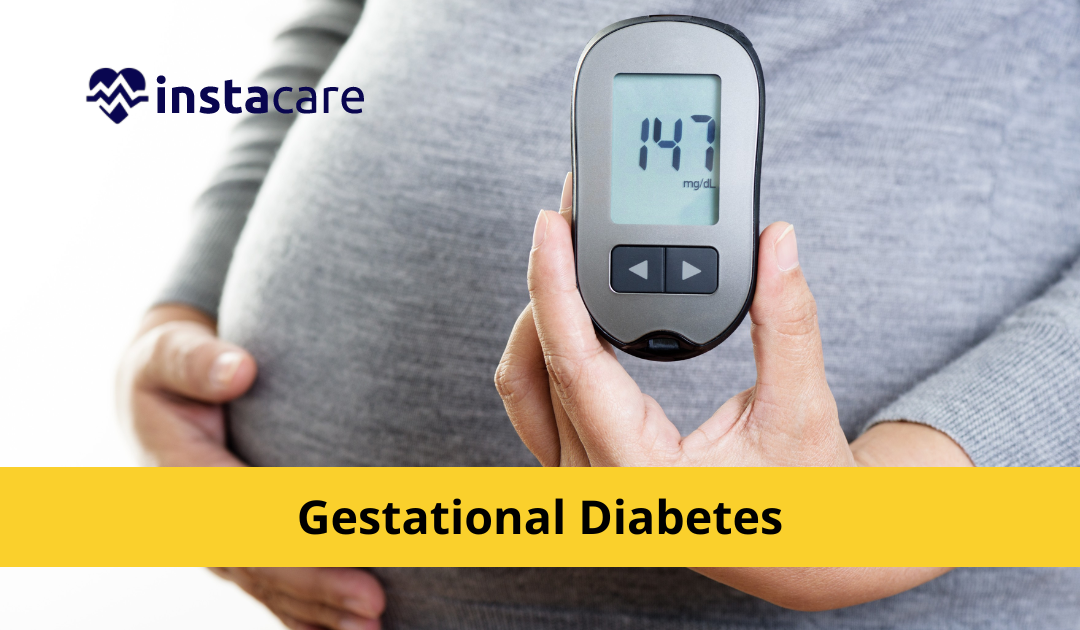When the body cannot create enough insulin while pregnant, gestational diabetes develops. During pregnancy, those who have this syndrome experience elevated blood sugar levels.
What Is Gestational Diabetes?
Some women may experience elevated blood sugar levels while pregnant. Gestational diabetes or also gestational diabetes mellitus (GDM) is the term used to describe this disorder. In most cases, gestational diabetes appears between weeks 24 and 28 of pregnancy.
If you get gestational diabetes, it doesn't mean you already have diabetes or will get it again in the future. However, having it increases your risk of later acquiring type 2 diabetes.
Gestational diabetes' effect on babies increases your child's risk of getting diabetes if it is not treated correctly. It may raise the likelihood of difficulties during pregnancy and delivery for both you and your unborn child.
Warning Signs And Gestational Diabetes Symptoms
Some warning signs and gestational diabetes symptoms are:
- Fatigue
- Distorted vision
- Severe thirst
- Nausea
- Persistent cutaneous, vaginal, or bladder infections
- Often urinating
Gestational Diabetes Cause
Gestational diabetes develops when your body cannot produce enough insulin while pregnant. Your body creates more of several hormones during pregnancy, such as:
- Placental lactogen in humans (hPL)
- Other hormones that worsen insulin resistance
Your placenta is impacted by these hormones, which support your pregnancy. Your body produces more of these hormones with time. Your body may become less sensitive to the hormone insulin, which controls your blood sugar, as a result.
Insulin aids in the transfer of glucose from the blood into the cells, where it is used as fuel. Your body naturally becomes a little more sensitive to insulin during pregnancy, which makes more glucose accessible in your blood for the baby to absorb.
Your blood sugar levels may rise excessively if the insulin resistance gets out of control. Gestational diabetes may result from this.
View More: Can A Woman Get Pregnant After Menopause?
What Issues May Result From Gestational Diabetes?
Blood sugar levels may continue to be higher than they should be throughout your pregnancy if gestational diabetes is poorly controlled or left untreated. This may result in issues that impact your and also your baby's health before, during, and after birth.
The following complications may have an impact on you:
- Blood pressure is high
- Preeclampsia
- Postpartum depression
- Early birth
- Stillbirth
- Cesarean section
The following complications may harm your infant:
- Elevated birth weight (macrosomia)
- Congenital disabilities like shoulder dystocia
- Respiratory issues, such as respiratory distress syndrome
- Low blood glucose (hypoglycemia)
- Greater chance of diabetes later in life
- Jaundice
You can take action to manage your gestational diabetes to prevent these consequences. For instance, go to your prenatal care appointments and adhere to a doctor's recommended course of action.
How To Deal With Gestational Diabetes
The secret is to move swiftly. Gestational diabetes can harm you and your unborn child even though it is manageable.
The goal of gestational diabetes treatment is to maintain average blood glucose (blood sugar) levels. It may also involve frequent physical activity and special meal programs. Additionally, it might entail insulin injections and routine blood glucose checks.
For pregnant women who test their blood glucose levels, it’s advised to set the following goal:
- Fewer than 95 mg/dl before a meal
- Immediately following a meal: 140 mg/dl or less
- Immediately following a meal, 120 mg/dl or less
Never forget that this is curable, and working with your medical team can guarantee a good pregnancy.
Maintain A Proper Diet And Exercise
Exercise and a healthy gestational diabetes diet can give you the upper hand if you have diabetes, regardless of the kind. Your success with gestational diabetes depends on maintaining a healthy diet. Your doctor may assist you in creating a meal plan that is appropriate for you, helping you choose the best foods and quick meal suggestions to keep you strong and healthy.
Additionally, exercise is crucial. During your pregnancy, discuss with your doctor how much movement is safe for you and your unborn child. Use these resources to stay up to date on daily activity suggestions. The most crucial thing also to keep in mind is to act as soon as possible, stick with it, and remain aware of your condition. It is curable. It's controllable. And you can prevail in this battle.
Conclusion
When the body cannot create enough insulin while pregnant, gestational diabetes develops, leading to elevated blood sugar levels. A doctor could advise food modifications and blood sugar monitoring if you have gestational diabetes to help you manage the illness. You might occasionally require insulin shots. If you have gestational diabetes while pregnant, your blood sugar levels should typically return to normal once you give birth. However, your risk of getting type 2 diabetes in later life could be higher.
Please book an appointment with the Best Diabetologist in Lahore, Karachi, Islamabad, and all major cities of Pakistan through InstaCare, or call our helpline at 03100002273 to find a verified doctor for your disease.
Source: https://instacare.pk/blog/gestational-diabetes-symptoms-causes-and-treatment








